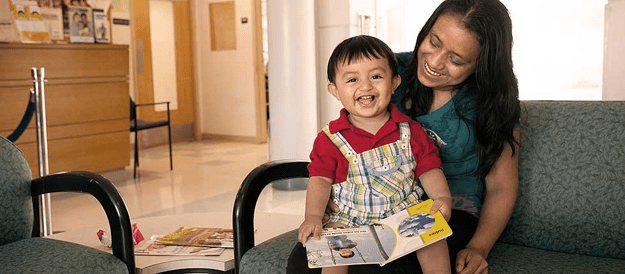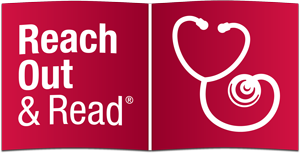LEYENDO JUNTOS
Reading Together

Reach Out and Read physicians and nurses provide primary care to hundreds of thousands of Latino children each year. In fact, 86% of Reach Out and Read sites nationwide serve families whose primary language is Spanish. Reach Out and Read medical providers are in a unique position to develop a trusting relationship with families early in a child’s life because they emphasize the importance of language, storytelling, and book-sharing to Latino families (in any language). Physicians and nurses, through their work with Reach Out and Read, have demonstrated that literacy promotion improves primary care provider-family relationships in cross-cultural settings.
To ensure that the Reach Out and Read message and model is delivered most effectively to Latino families, Reach Out and Read has launched Leyendo Juntos,(Reading Together), an initiative that will develop linguistically appropriate training and materials for Reach Out and Read medical providers. These materials will help providers to encourage Spanish-speaking parents and extended family members to read to their children. An important part of this process will be to learn from and build upon the best practices that medical providers at various levels of linguistic proficiency e.g., native Spanish speakers, near fluent speakers, and those who speak medically-appropriate Spanish have used when emphasizing the importance of early literacy to Spanish-speaking families.
The need for this type of intervention is clear. Consider the following statistics:
- Children of Spanish-speaking families are more than twice as likely to fail fourth-grade reading assessments than non-Latino white children.
- 58 percent of Latino fourth-graders read below the basic level.
- Latino families average 20 fewer books in their homes than their English-speaking counterparts.
- 46 percent of young Latino children (0-8 years) have mothers who did not graduate from high school.
- 28 percent of Latino children in the US live in poverty.
- 22 percent of all children in the United States under the age of 5 are Latino, but they are 20 percent less likely than other groups to be enrolled in early childhood education programs.
Through Leyendo Juntos, Reach Out and Read medical providers will enhance their ability to help Spanish-speaking families:
- Providers of differing levels of Spanish-language proficiency will learn strategies for effective anticipatory guidance;
- The initiative will emphasize respect for the patients’ cultures and primary language;
- Providers will understand the cultural context of literacy and the link between literacy and cari o (love, caring, affection);
- Providers will share with Spanish speaking families the links between reading and school readiness.

